MGT5PLS Assessment 4: Project Leadership Analysis - George Mueller
VerifiedAdded on 2023/06/04
|9
|2229
|429
Report
AI Summary
This report provides an analysis of George Edwin Mueller's leadership style, particularly his democratic approach, and its impact on projects like the Apollo program at NASA. It explores his biography, leadership style, and the effectiveness of his leadership behaviors, including building trust, acting with integrity, inspiring others, and fostering innovation. The report further examines how his leadership behaviors influenced the Apollo program across its lifecycle, highlighting both the positive impacts of teamwork and commitment and the time-consuming aspects of democratic decision-making. The conclusion reinforces the effectiveness of democratic leadership and innovative thinking in achieving project success, emphasizing the importance of engaging team members and resolving issues collaboratively. Desklib offers similar solved assignments for students.
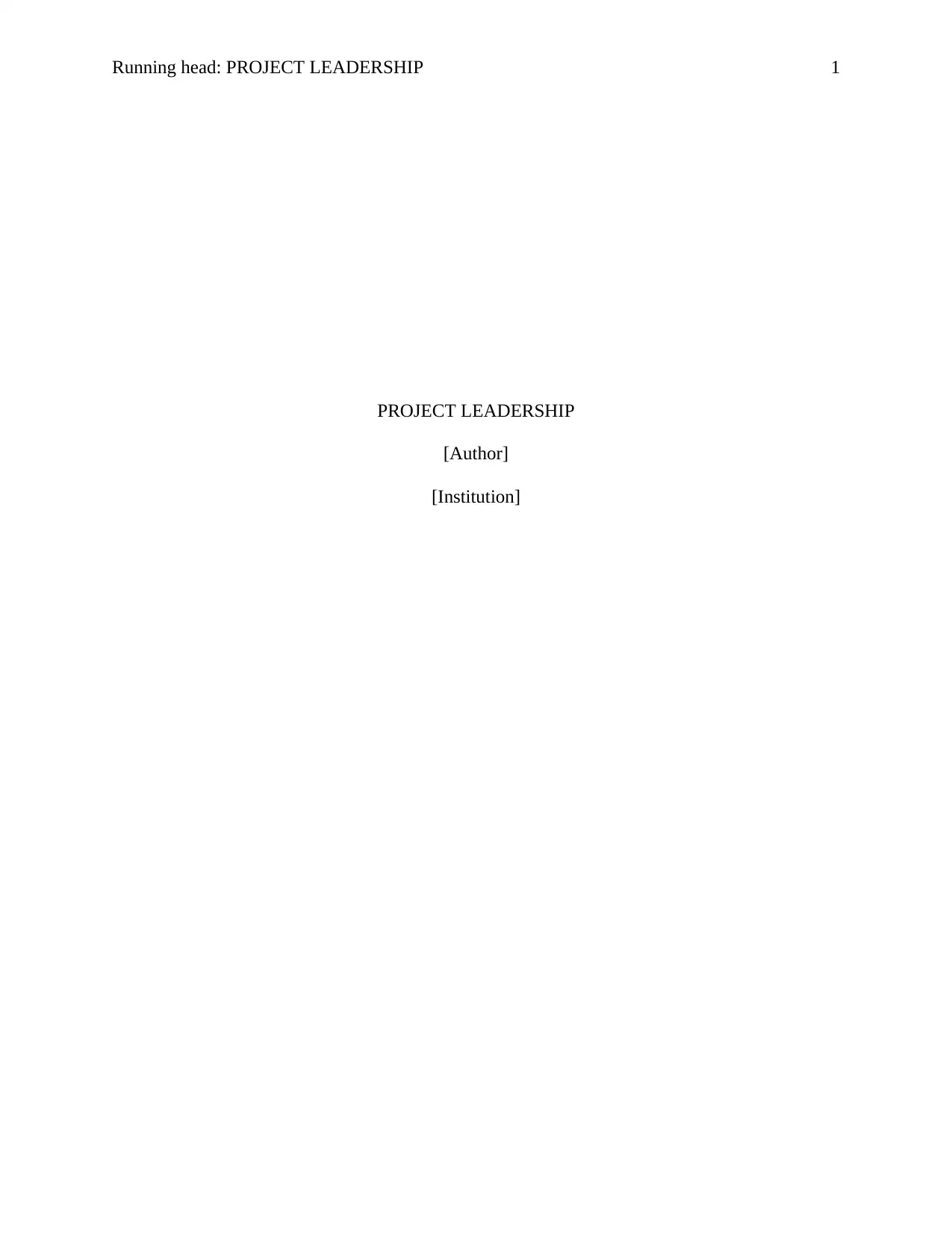
Running head: PROJECT LEADERSHIP 1
PROJECT LEADERSHIP
[Author]
[Institution]
PROJECT LEADERSHIP
[Author]
[Institution]
Paraphrase This Document
Need a fresh take? Get an instant paraphrase of this document with our AI Paraphraser
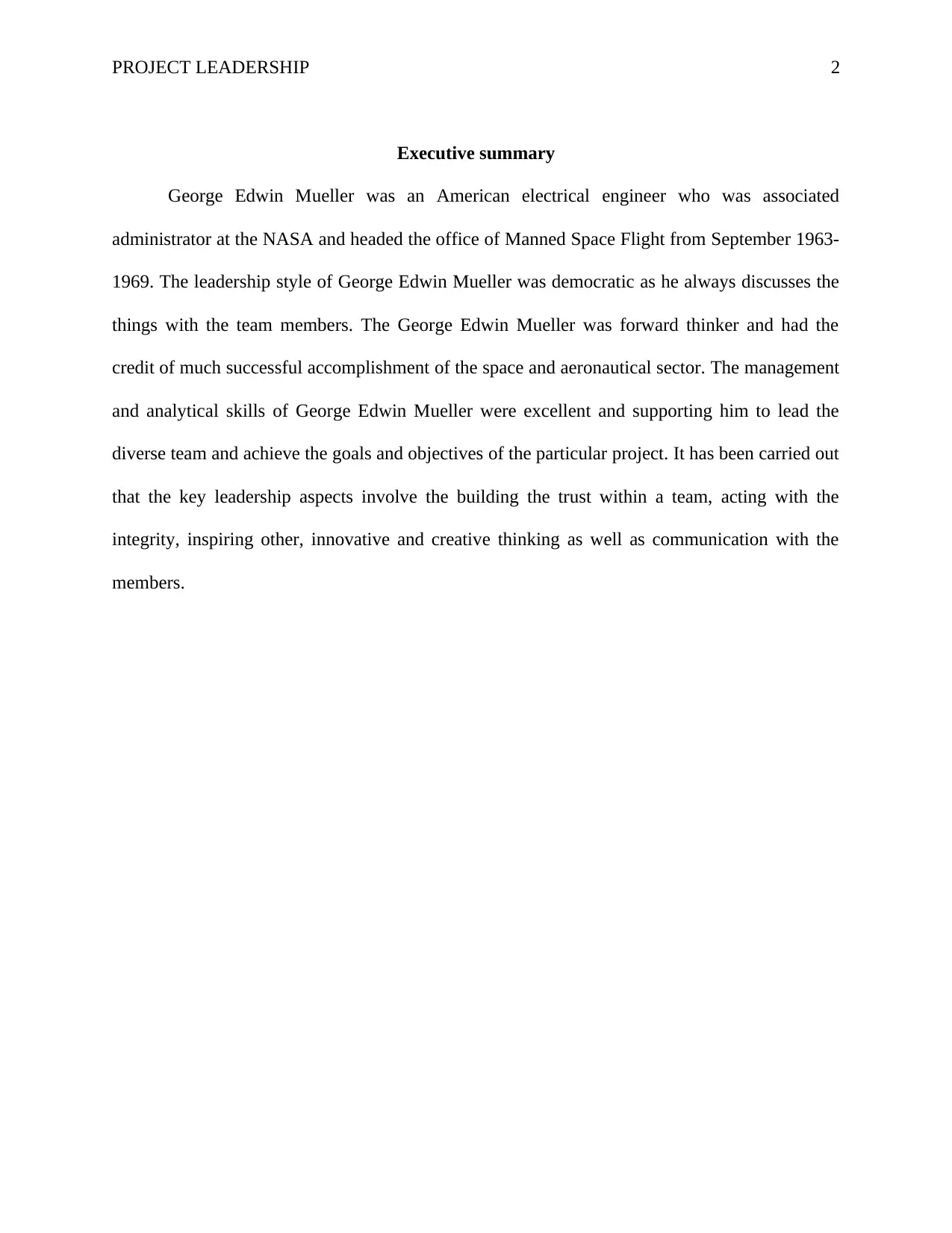
PROJECT LEADERSHIP 2
Executive summary
George Edwin Mueller was an American electrical engineer who was associated
administrator at the NASA and headed the office of Manned Space Flight from September 1963-
1969. The leadership style of George Edwin Mueller was democratic as he always discusses the
things with the team members. The George Edwin Mueller was forward thinker and had the
credit of much successful accomplishment of the space and aeronautical sector. The management
and analytical skills of George Edwin Mueller were excellent and supporting him to lead the
diverse team and achieve the goals and objectives of the particular project. It has been carried out
that the key leadership aspects involve the building the trust within a team, acting with the
integrity, inspiring other, innovative and creative thinking as well as communication with the
members.
Executive summary
George Edwin Mueller was an American electrical engineer who was associated
administrator at the NASA and headed the office of Manned Space Flight from September 1963-
1969. The leadership style of George Edwin Mueller was democratic as he always discusses the
things with the team members. The George Edwin Mueller was forward thinker and had the
credit of much successful accomplishment of the space and aeronautical sector. The management
and analytical skills of George Edwin Mueller were excellent and supporting him to lead the
diverse team and achieve the goals and objectives of the particular project. It has been carried out
that the key leadership aspects involve the building the trust within a team, acting with the
integrity, inspiring other, innovative and creative thinking as well as communication with the
members.
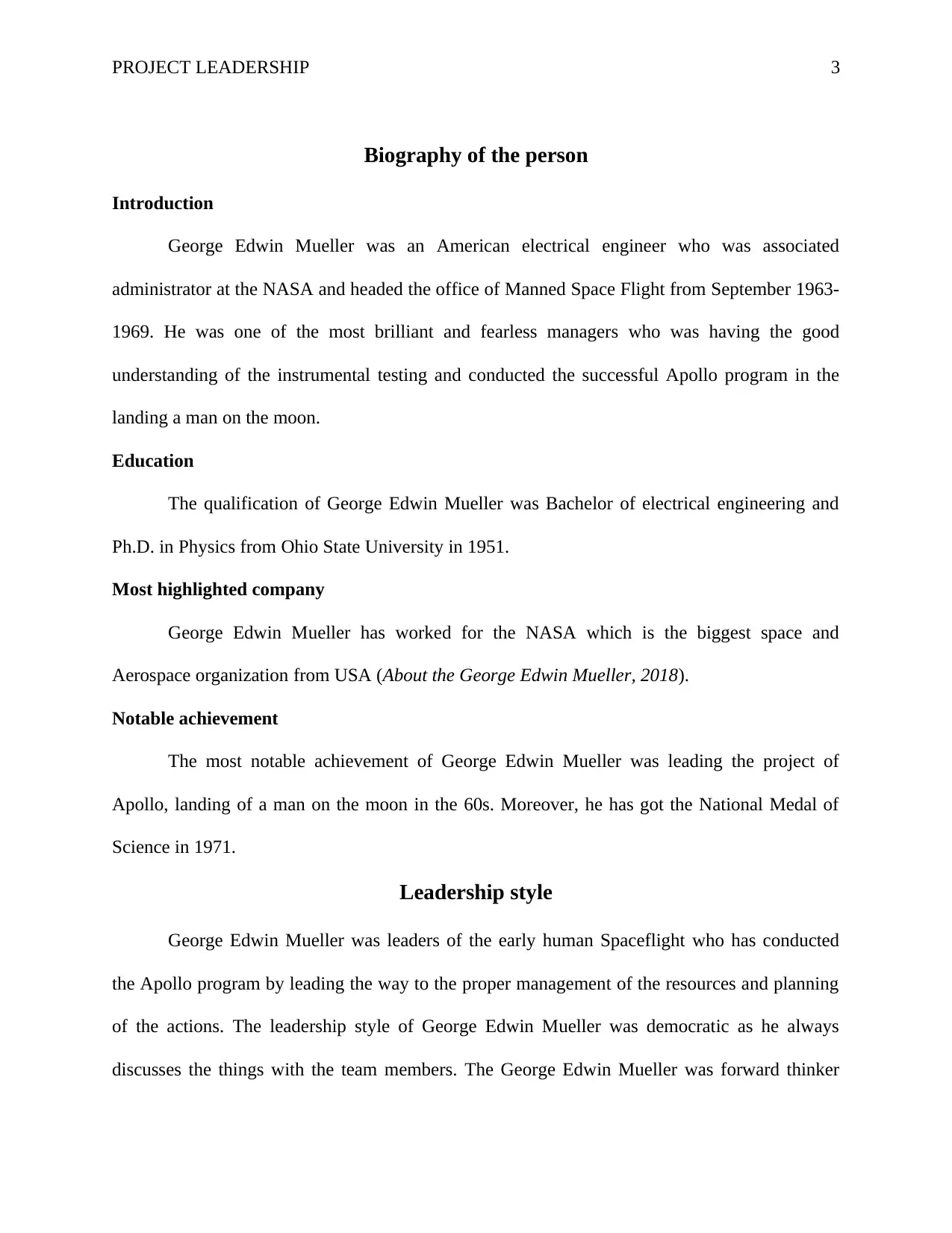
PROJECT LEADERSHIP 3
Biography of the person
Introduction
George Edwin Mueller was an American electrical engineer who was associated
administrator at the NASA and headed the office of Manned Space Flight from September 1963-
1969. He was one of the most brilliant and fearless managers who was having the good
understanding of the instrumental testing and conducted the successful Apollo program in the
landing a man on the moon.
Education
The qualification of George Edwin Mueller was Bachelor of electrical engineering and
Ph.D. in Physics from Ohio State University in 1951.
Most highlighted company
George Edwin Mueller has worked for the NASA which is the biggest space and
Aerospace organization from USA (About the George Edwin Mueller, 2018).
Notable achievement
The most notable achievement of George Edwin Mueller was leading the project of
Apollo, landing of a man on the moon in the 60s. Moreover, he has got the National Medal of
Science in 1971.
Leadership style
George Edwin Mueller was leaders of the early human Spaceflight who has conducted
the Apollo program by leading the way to the proper management of the resources and planning
of the actions. The leadership style of George Edwin Mueller was democratic as he always
discusses the things with the team members. The George Edwin Mueller was forward thinker
Biography of the person
Introduction
George Edwin Mueller was an American electrical engineer who was associated
administrator at the NASA and headed the office of Manned Space Flight from September 1963-
1969. He was one of the most brilliant and fearless managers who was having the good
understanding of the instrumental testing and conducted the successful Apollo program in the
landing a man on the moon.
Education
The qualification of George Edwin Mueller was Bachelor of electrical engineering and
Ph.D. in Physics from Ohio State University in 1951.
Most highlighted company
George Edwin Mueller has worked for the NASA which is the biggest space and
Aerospace organization from USA (About the George Edwin Mueller, 2018).
Notable achievement
The most notable achievement of George Edwin Mueller was leading the project of
Apollo, landing of a man on the moon in the 60s. Moreover, he has got the National Medal of
Science in 1971.
Leadership style
George Edwin Mueller was leaders of the early human Spaceflight who has conducted
the Apollo program by leading the way to the proper management of the resources and planning
of the actions. The leadership style of George Edwin Mueller was democratic as he always
discusses the things with the team members. The George Edwin Mueller was forward thinker
⊘ This is a preview!⊘
Do you want full access?
Subscribe today to unlock all pages.

Trusted by 1+ million students worldwide
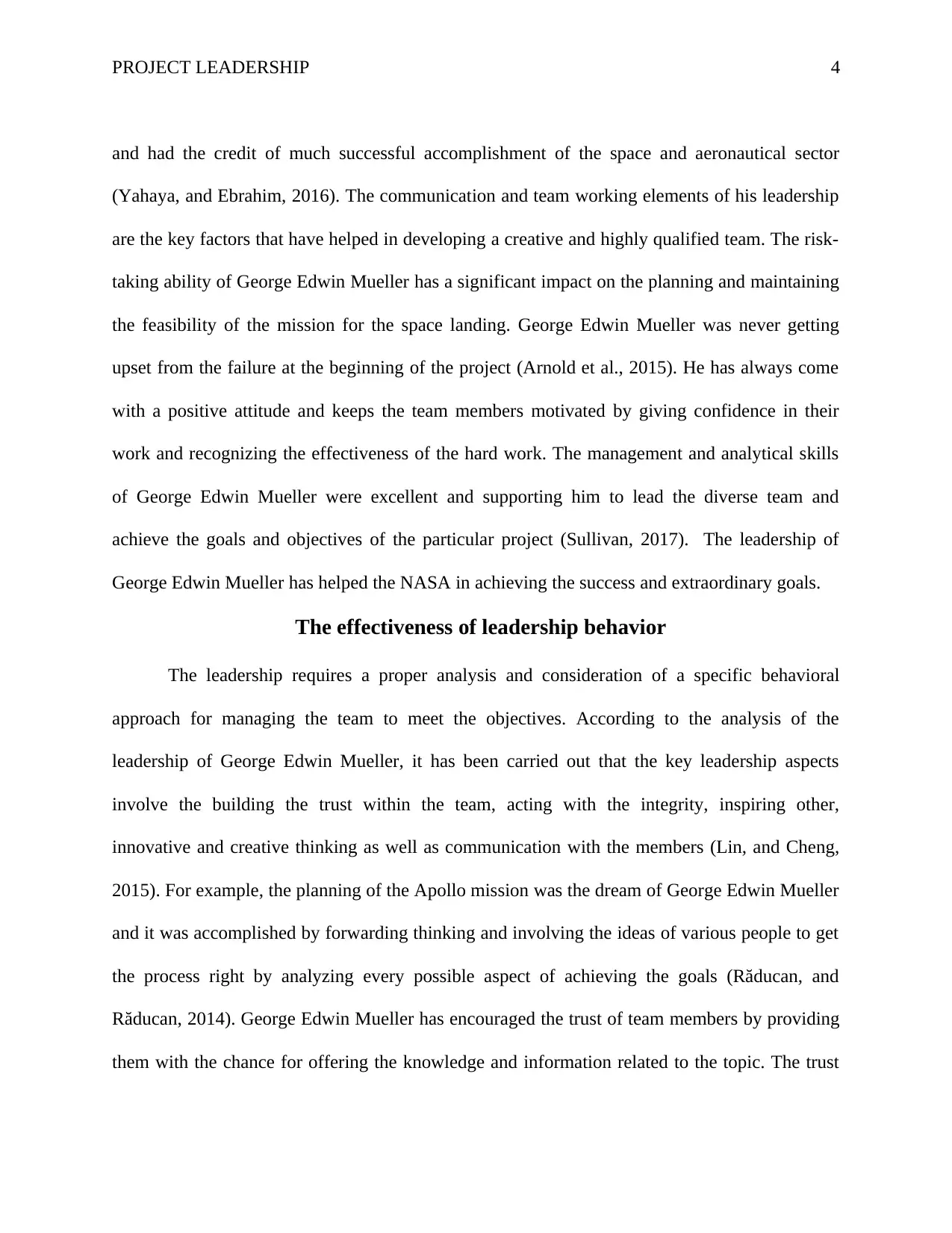
PROJECT LEADERSHIP 4
and had the credit of much successful accomplishment of the space and aeronautical sector
(Yahaya, and Ebrahim, 2016). The communication and team working elements of his leadership
are the key factors that have helped in developing a creative and highly qualified team. The risk-
taking ability of George Edwin Mueller has a significant impact on the planning and maintaining
the feasibility of the mission for the space landing. George Edwin Mueller was never getting
upset from the failure at the beginning of the project (Arnold et al., 2015). He has always come
with a positive attitude and keeps the team members motivated by giving confidence in their
work and recognizing the effectiveness of the hard work. The management and analytical skills
of George Edwin Mueller were excellent and supporting him to lead the diverse team and
achieve the goals and objectives of the particular project (Sullivan, 2017). The leadership of
George Edwin Mueller has helped the NASA in achieving the success and extraordinary goals.
The effectiveness of leadership behavior
The leadership requires a proper analysis and consideration of a specific behavioral
approach for managing the team to meet the objectives. According to the analysis of the
leadership of George Edwin Mueller, it has been carried out that the key leadership aspects
involve the building the trust within the team, acting with the integrity, inspiring other,
innovative and creative thinking as well as communication with the members (Lin, and Cheng,
2015). For example, the planning of the Apollo mission was the dream of George Edwin Mueller
and it was accomplished by forwarding thinking and involving the ideas of various people to get
the process right by analyzing every possible aspect of achieving the goals (Răducan, and
Răducan, 2014). George Edwin Mueller has encouraged the trust of team members by providing
them with the chance for offering the knowledge and information related to the topic. The trust
and had the credit of much successful accomplishment of the space and aeronautical sector
(Yahaya, and Ebrahim, 2016). The communication and team working elements of his leadership
are the key factors that have helped in developing a creative and highly qualified team. The risk-
taking ability of George Edwin Mueller has a significant impact on the planning and maintaining
the feasibility of the mission for the space landing. George Edwin Mueller was never getting
upset from the failure at the beginning of the project (Arnold et al., 2015). He has always come
with a positive attitude and keeps the team members motivated by giving confidence in their
work and recognizing the effectiveness of the hard work. The management and analytical skills
of George Edwin Mueller were excellent and supporting him to lead the diverse team and
achieve the goals and objectives of the particular project (Sullivan, 2017). The leadership of
George Edwin Mueller has helped the NASA in achieving the success and extraordinary goals.
The effectiveness of leadership behavior
The leadership requires a proper analysis and consideration of a specific behavioral
approach for managing the team to meet the objectives. According to the analysis of the
leadership of George Edwin Mueller, it has been carried out that the key leadership aspects
involve the building the trust within the team, acting with the integrity, inspiring other,
innovative and creative thinking as well as communication with the members (Lin, and Cheng,
2015). For example, the planning of the Apollo mission was the dream of George Edwin Mueller
and it was accomplished by forwarding thinking and involving the ideas of various people to get
the process right by analyzing every possible aspect of achieving the goals (Răducan, and
Răducan, 2014). George Edwin Mueller has encouraged the trust of team members by providing
them with the chance for offering the knowledge and information related to the topic. The trust
Paraphrase This Document
Need a fresh take? Get an instant paraphrase of this document with our AI Paraphraser
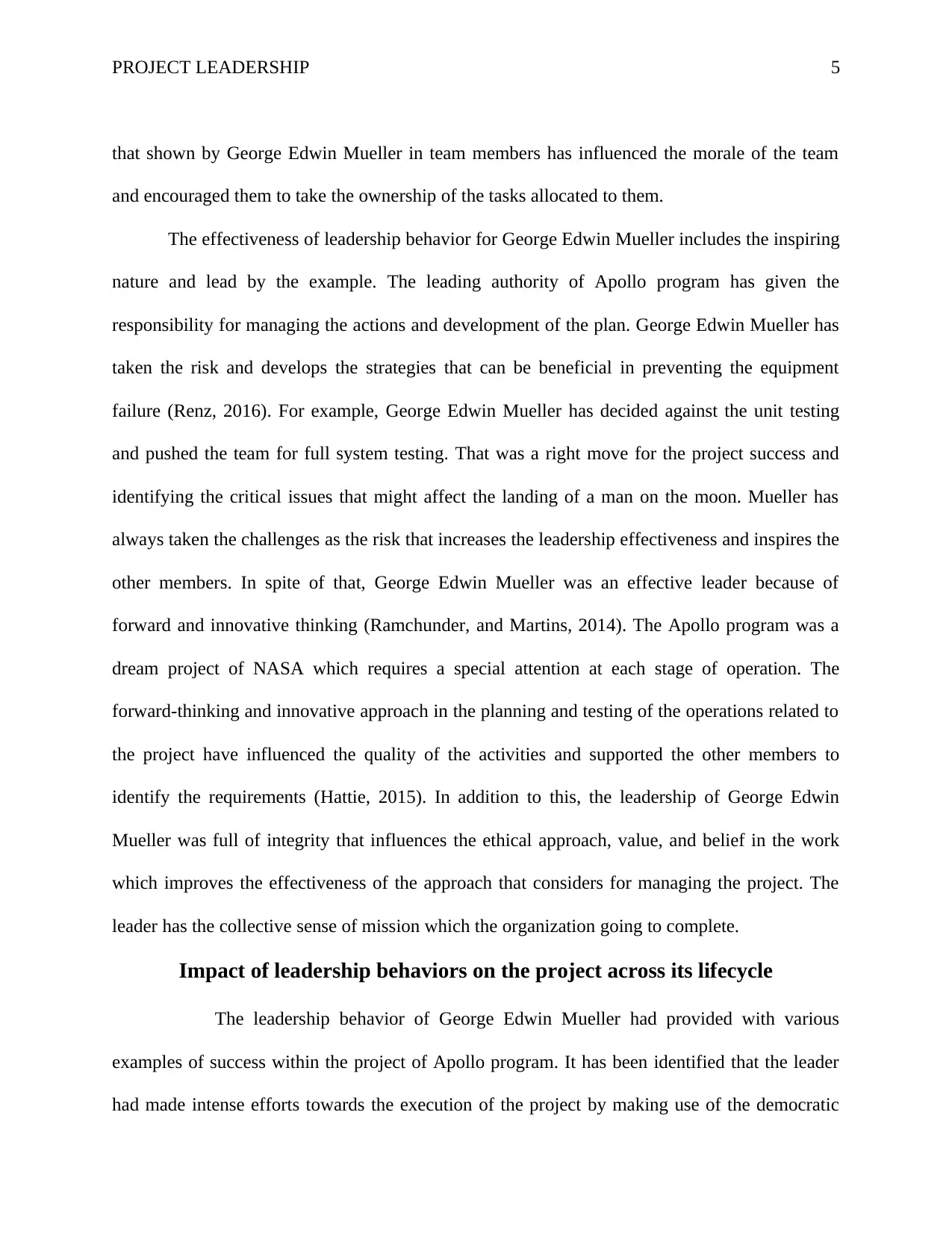
PROJECT LEADERSHIP 5
that shown by George Edwin Mueller in team members has influenced the morale of the team
and encouraged them to take the ownership of the tasks allocated to them.
The effectiveness of leadership behavior for George Edwin Mueller includes the inspiring
nature and lead by the example. The leading authority of Apollo program has given the
responsibility for managing the actions and development of the plan. George Edwin Mueller has
taken the risk and develops the strategies that can be beneficial in preventing the equipment
failure (Renz, 2016). For example, George Edwin Mueller has decided against the unit testing
and pushed the team for full system testing. That was a right move for the project success and
identifying the critical issues that might affect the landing of a man on the moon. Mueller has
always taken the challenges as the risk that increases the leadership effectiveness and inspires the
other members. In spite of that, George Edwin Mueller was an effective leader because of
forward and innovative thinking (Ramchunder, and Martins, 2014). The Apollo program was a
dream project of NASA which requires a special attention at each stage of operation. The
forward-thinking and innovative approach in the planning and testing of the operations related to
the project have influenced the quality of the activities and supported the other members to
identify the requirements (Hattie, 2015). In addition to this, the leadership of George Edwin
Mueller was full of integrity that influences the ethical approach, value, and belief in the work
which improves the effectiveness of the approach that considers for managing the project. The
leader has the collective sense of mission which the organization going to complete.
Impact of leadership behaviors on the project across its lifecycle
The leadership behavior of George Edwin Mueller had provided with various
examples of success within the project of Apollo program. It has been identified that the leader
had made intense efforts towards the execution of the project by making use of the democratic
that shown by George Edwin Mueller in team members has influenced the morale of the team
and encouraged them to take the ownership of the tasks allocated to them.
The effectiveness of leadership behavior for George Edwin Mueller includes the inspiring
nature and lead by the example. The leading authority of Apollo program has given the
responsibility for managing the actions and development of the plan. George Edwin Mueller has
taken the risk and develops the strategies that can be beneficial in preventing the equipment
failure (Renz, 2016). For example, George Edwin Mueller has decided against the unit testing
and pushed the team for full system testing. That was a right move for the project success and
identifying the critical issues that might affect the landing of a man on the moon. Mueller has
always taken the challenges as the risk that increases the leadership effectiveness and inspires the
other members. In spite of that, George Edwin Mueller was an effective leader because of
forward and innovative thinking (Ramchunder, and Martins, 2014). The Apollo program was a
dream project of NASA which requires a special attention at each stage of operation. The
forward-thinking and innovative approach in the planning and testing of the operations related to
the project have influenced the quality of the activities and supported the other members to
identify the requirements (Hattie, 2015). In addition to this, the leadership of George Edwin
Mueller was full of integrity that influences the ethical approach, value, and belief in the work
which improves the effectiveness of the approach that considers for managing the project. The
leader has the collective sense of mission which the organization going to complete.
Impact of leadership behaviors on the project across its lifecycle
The leadership behavior of George Edwin Mueller had provided with various
examples of success within the project of Apollo program. It has been identified that the leader
had made intense efforts towards the execution of the project by making use of the democratic
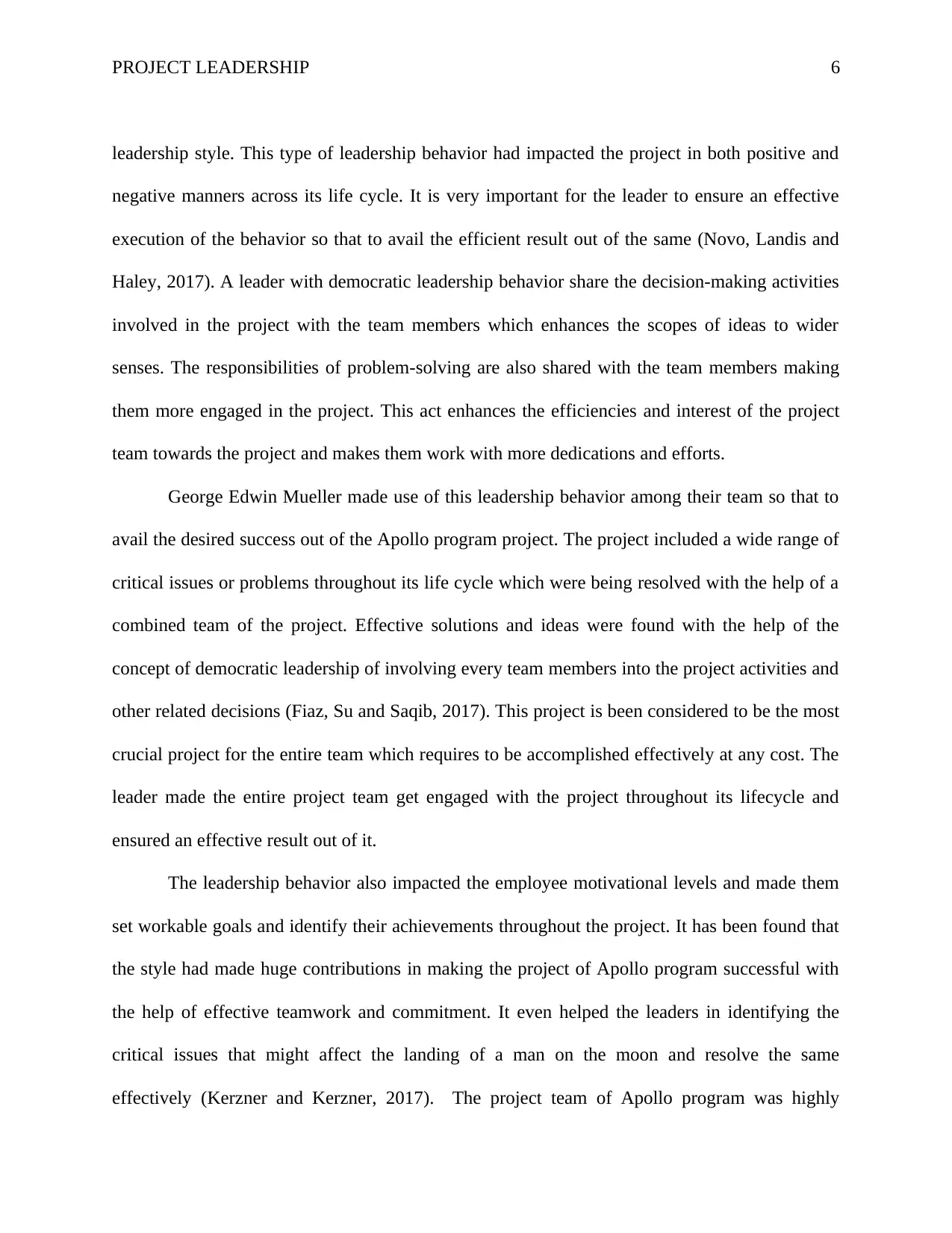
PROJECT LEADERSHIP 6
leadership style. This type of leadership behavior had impacted the project in both positive and
negative manners across its life cycle. It is very important for the leader to ensure an effective
execution of the behavior so that to avail the efficient result out of the same (Novo, Landis and
Haley, 2017). A leader with democratic leadership behavior share the decision-making activities
involved in the project with the team members which enhances the scopes of ideas to wider
senses. The responsibilities of problem-solving are also shared with the team members making
them more engaged in the project. This act enhances the efficiencies and interest of the project
team towards the project and makes them work with more dedications and efforts.
George Edwin Mueller made use of this leadership behavior among their team so that to
avail the desired success out of the Apollo program project. The project included a wide range of
critical issues or problems throughout its life cycle which were being resolved with the help of a
combined team of the project. Effective solutions and ideas were found with the help of the
concept of democratic leadership of involving every team members into the project activities and
other related decisions (Fiaz, Su and Saqib, 2017). This project is been considered to be the most
crucial project for the entire team which requires to be accomplished effectively at any cost. The
leader made the entire project team get engaged with the project throughout its lifecycle and
ensured an effective result out of it.
The leadership behavior also impacted the employee motivational levels and made them
set workable goals and identify their achievements throughout the project. It has been found that
the style had made huge contributions in making the project of Apollo program successful with
the help of effective teamwork and commitment. It even helped the leaders in identifying the
critical issues that might affect the landing of a man on the moon and resolve the same
effectively (Kerzner and Kerzner, 2017). The project team of Apollo program was highly
leadership style. This type of leadership behavior had impacted the project in both positive and
negative manners across its life cycle. It is very important for the leader to ensure an effective
execution of the behavior so that to avail the efficient result out of the same (Novo, Landis and
Haley, 2017). A leader with democratic leadership behavior share the decision-making activities
involved in the project with the team members which enhances the scopes of ideas to wider
senses. The responsibilities of problem-solving are also shared with the team members making
them more engaged in the project. This act enhances the efficiencies and interest of the project
team towards the project and makes them work with more dedications and efforts.
George Edwin Mueller made use of this leadership behavior among their team so that to
avail the desired success out of the Apollo program project. The project included a wide range of
critical issues or problems throughout its life cycle which were being resolved with the help of a
combined team of the project. Effective solutions and ideas were found with the help of the
concept of democratic leadership of involving every team members into the project activities and
other related decisions (Fiaz, Su and Saqib, 2017). This project is been considered to be the most
crucial project for the entire team which requires to be accomplished effectively at any cost. The
leader made the entire project team get engaged with the project throughout its lifecycle and
ensured an effective result out of it.
The leadership behavior also impacted the employee motivational levels and made them
set workable goals and identify their achievements throughout the project. It has been found that
the style had made huge contributions in making the project of Apollo program successful with
the help of effective teamwork and commitment. It even helped the leaders in identifying the
critical issues that might affect the landing of a man on the moon and resolve the same
effectively (Kerzner and Kerzner, 2017). The project team of Apollo program was highly
⊘ This is a preview!⊘
Do you want full access?
Subscribe today to unlock all pages.

Trusted by 1+ million students worldwide
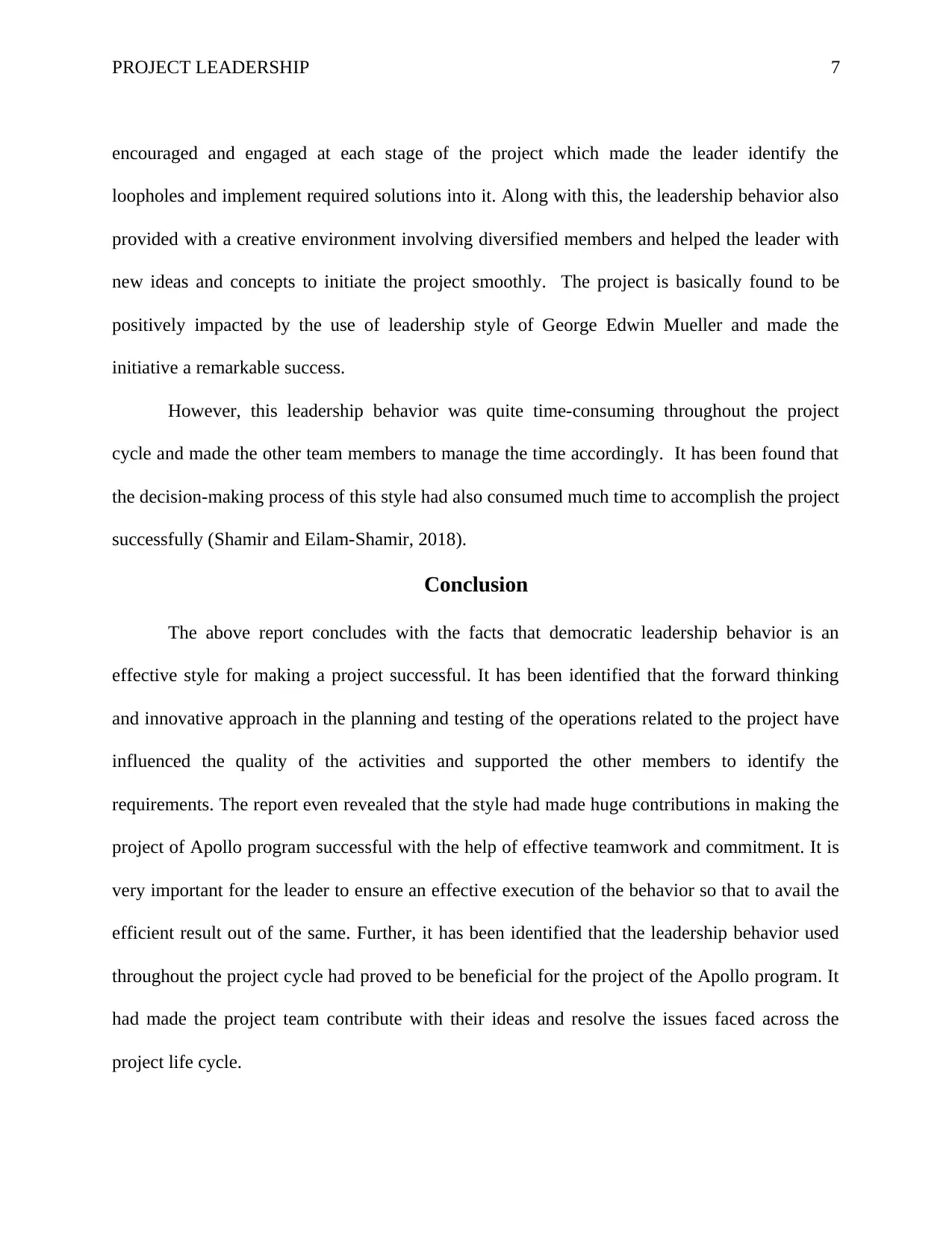
PROJECT LEADERSHIP 7
encouraged and engaged at each stage of the project which made the leader identify the
loopholes and implement required solutions into it. Along with this, the leadership behavior also
provided with a creative environment involving diversified members and helped the leader with
new ideas and concepts to initiate the project smoothly. The project is basically found to be
positively impacted by the use of leadership style of George Edwin Mueller and made the
initiative a remarkable success.
However, this leadership behavior was quite time-consuming throughout the project
cycle and made the other team members to manage the time accordingly. It has been found that
the decision-making process of this style had also consumed much time to accomplish the project
successfully (Shamir and Eilam-Shamir, 2018).
Conclusion
The above report concludes with the facts that democratic leadership behavior is an
effective style for making a project successful. It has been identified that the forward thinking
and innovative approach in the planning and testing of the operations related to the project have
influenced the quality of the activities and supported the other members to identify the
requirements. The report even revealed that the style had made huge contributions in making the
project of Apollo program successful with the help of effective teamwork and commitment. It is
very important for the leader to ensure an effective execution of the behavior so that to avail the
efficient result out of the same. Further, it has been identified that the leadership behavior used
throughout the project cycle had proved to be beneficial for the project of the Apollo program. It
had made the project team contribute with their ideas and resolve the issues faced across the
project life cycle.
encouraged and engaged at each stage of the project which made the leader identify the
loopholes and implement required solutions into it. Along with this, the leadership behavior also
provided with a creative environment involving diversified members and helped the leader with
new ideas and concepts to initiate the project smoothly. The project is basically found to be
positively impacted by the use of leadership style of George Edwin Mueller and made the
initiative a remarkable success.
However, this leadership behavior was quite time-consuming throughout the project
cycle and made the other team members to manage the time accordingly. It has been found that
the decision-making process of this style had also consumed much time to accomplish the project
successfully (Shamir and Eilam-Shamir, 2018).
Conclusion
The above report concludes with the facts that democratic leadership behavior is an
effective style for making a project successful. It has been identified that the forward thinking
and innovative approach in the planning and testing of the operations related to the project have
influenced the quality of the activities and supported the other members to identify the
requirements. The report even revealed that the style had made huge contributions in making the
project of Apollo program successful with the help of effective teamwork and commitment. It is
very important for the leader to ensure an effective execution of the behavior so that to avail the
efficient result out of the same. Further, it has been identified that the leadership behavior used
throughout the project cycle had proved to be beneficial for the project of the Apollo program. It
had made the project team contribute with their ideas and resolve the issues faced across the
project life cycle.
Paraphrase This Document
Need a fresh take? Get an instant paraphrase of this document with our AI Paraphraser
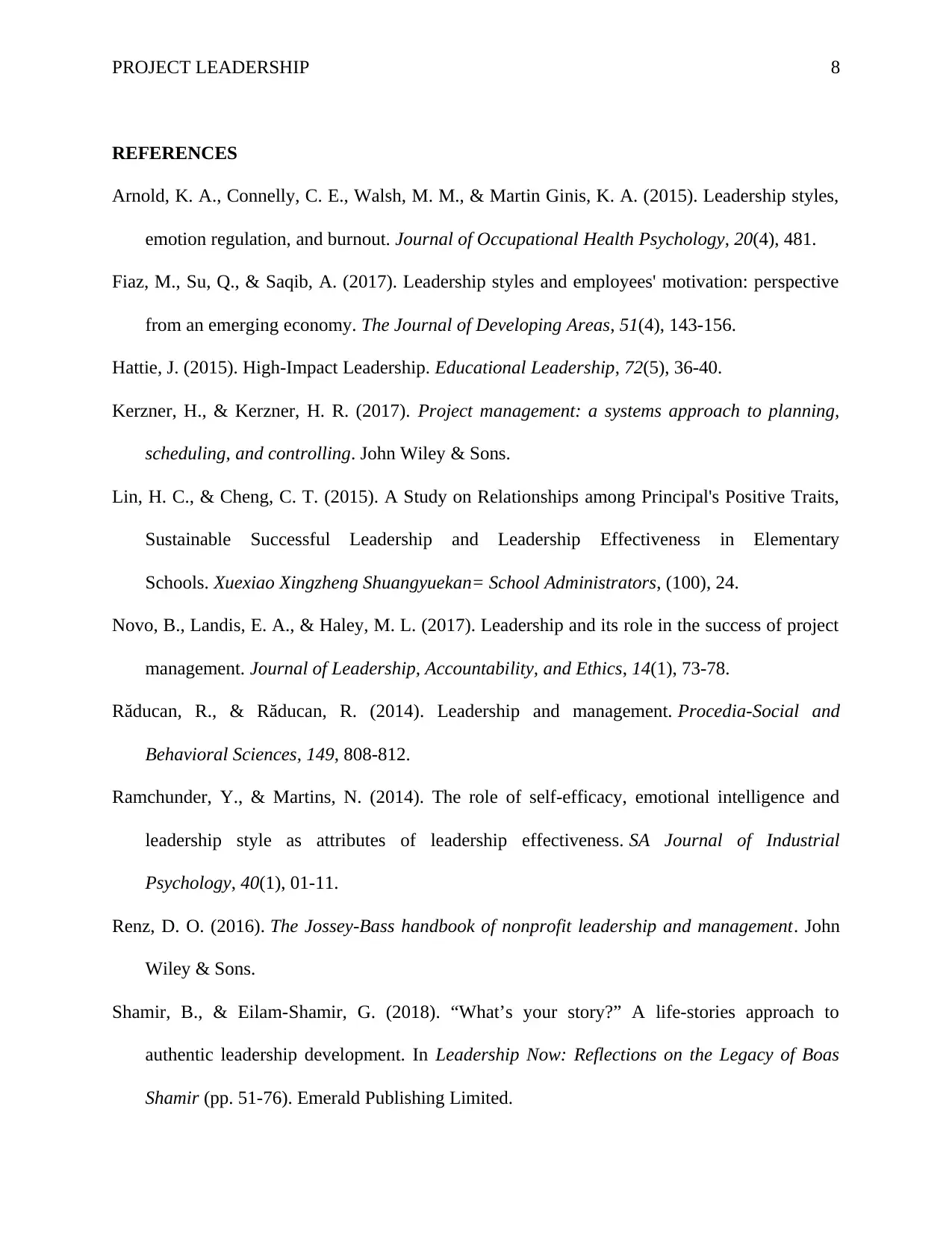
PROJECT LEADERSHIP 8
REFERENCES
Arnold, K. A., Connelly, C. E., Walsh, M. M., & Martin Ginis, K. A. (2015). Leadership styles,
emotion regulation, and burnout. Journal of Occupational Health Psychology, 20(4), 481.
Fiaz, M., Su, Q., & Saqib, A. (2017). Leadership styles and employees' motivation: perspective
from an emerging economy. The Journal of Developing Areas, 51(4), 143-156.
Hattie, J. (2015). High-Impact Leadership. Educational Leadership, 72(5), 36-40.
Kerzner, H., & Kerzner, H. R. (2017). Project management: a systems approach to planning,
scheduling, and controlling. John Wiley & Sons.
Lin, H. C., & Cheng, C. T. (2015). A Study on Relationships among Principal's Positive Traits,
Sustainable Successful Leadership and Leadership Effectiveness in Elementary
Schools. Xuexiao Xingzheng Shuangyuekan= School Administrators, (100), 24.
Novo, B., Landis, E. A., & Haley, M. L. (2017). Leadership and its role in the success of project
management. Journal of Leadership, Accountability, and Ethics, 14(1), 73-78.
Răducan, R., & Răducan, R. (2014). Leadership and management. Procedia-Social and
Behavioral Sciences, 149, 808-812.
Ramchunder, Y., & Martins, N. (2014). The role of self-efficacy, emotional intelligence and
leadership style as attributes of leadership effectiveness. SA Journal of Industrial
Psychology, 40(1), 01-11.
Renz, D. O. (2016). The Jossey-Bass handbook of nonprofit leadership and management. John
Wiley & Sons.
Shamir, B., & Eilam-Shamir, G. (2018). “What’s your story?” A life-stories approach to
authentic leadership development. In Leadership Now: Reflections on the Legacy of Boas
Shamir (pp. 51-76). Emerald Publishing Limited.
REFERENCES
Arnold, K. A., Connelly, C. E., Walsh, M. M., & Martin Ginis, K. A. (2015). Leadership styles,
emotion regulation, and burnout. Journal of Occupational Health Psychology, 20(4), 481.
Fiaz, M., Su, Q., & Saqib, A. (2017). Leadership styles and employees' motivation: perspective
from an emerging economy. The Journal of Developing Areas, 51(4), 143-156.
Hattie, J. (2015). High-Impact Leadership. Educational Leadership, 72(5), 36-40.
Kerzner, H., & Kerzner, H. R. (2017). Project management: a systems approach to planning,
scheduling, and controlling. John Wiley & Sons.
Lin, H. C., & Cheng, C. T. (2015). A Study on Relationships among Principal's Positive Traits,
Sustainable Successful Leadership and Leadership Effectiveness in Elementary
Schools. Xuexiao Xingzheng Shuangyuekan= School Administrators, (100), 24.
Novo, B., Landis, E. A., & Haley, M. L. (2017). Leadership and its role in the success of project
management. Journal of Leadership, Accountability, and Ethics, 14(1), 73-78.
Răducan, R., & Răducan, R. (2014). Leadership and management. Procedia-Social and
Behavioral Sciences, 149, 808-812.
Ramchunder, Y., & Martins, N. (2014). The role of self-efficacy, emotional intelligence and
leadership style as attributes of leadership effectiveness. SA Journal of Industrial
Psychology, 40(1), 01-11.
Renz, D. O. (2016). The Jossey-Bass handbook of nonprofit leadership and management. John
Wiley & Sons.
Shamir, B., & Eilam-Shamir, G. (2018). “What’s your story?” A life-stories approach to
authentic leadership development. In Leadership Now: Reflections on the Legacy of Boas
Shamir (pp. 51-76). Emerald Publishing Limited.
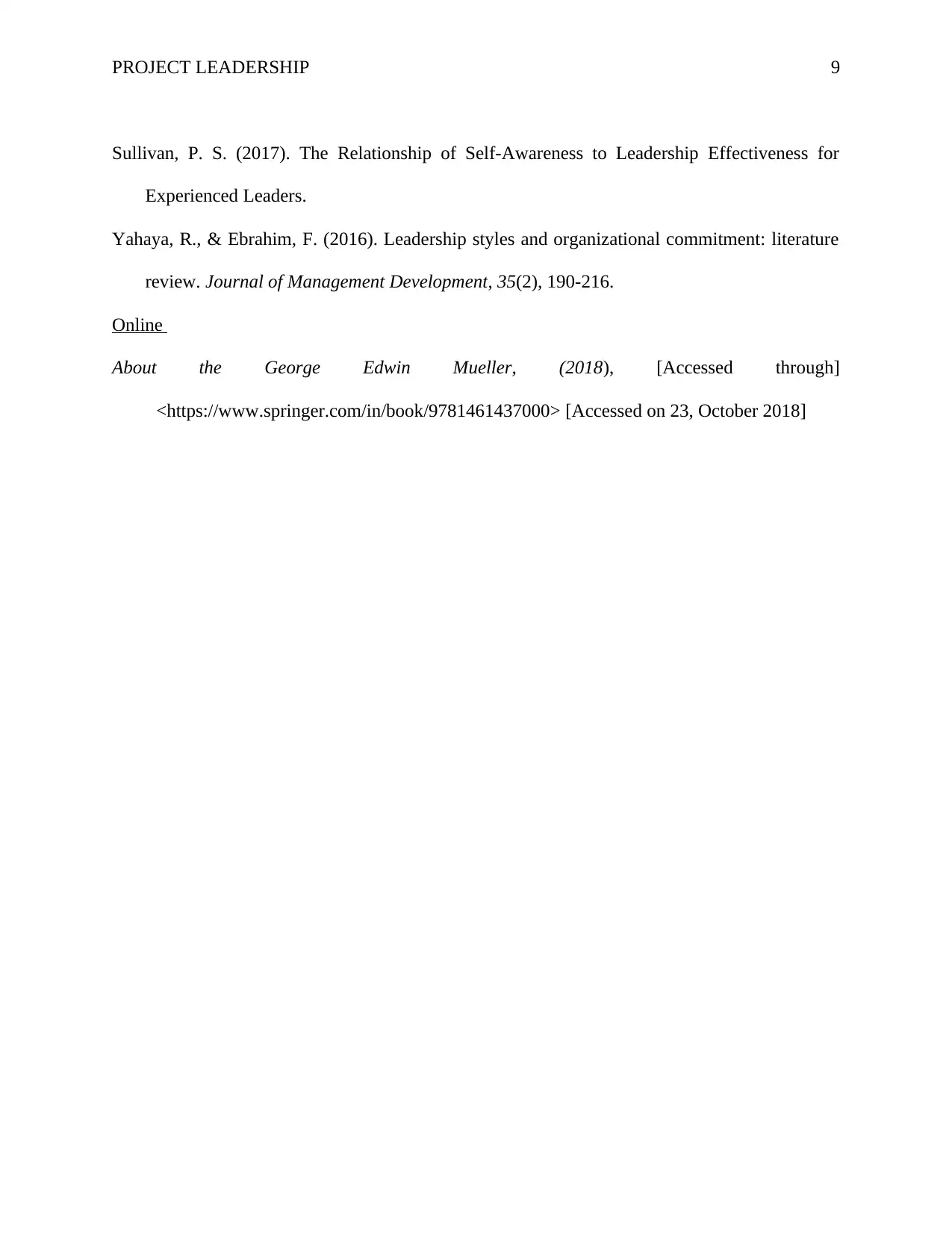
PROJECT LEADERSHIP 9
Sullivan, P. S. (2017). The Relationship of Self-Awareness to Leadership Effectiveness for
Experienced Leaders.
Yahaya, R., & Ebrahim, F. (2016). Leadership styles and organizational commitment: literature
review. Journal of Management Development, 35(2), 190-216.
Online
About the George Edwin Mueller, (2018), [Accessed through]
<https://www.springer.com/in/book/9781461437000> [Accessed on 23, October 2018]
Sullivan, P. S. (2017). The Relationship of Self-Awareness to Leadership Effectiveness for
Experienced Leaders.
Yahaya, R., & Ebrahim, F. (2016). Leadership styles and organizational commitment: literature
review. Journal of Management Development, 35(2), 190-216.
Online
About the George Edwin Mueller, (2018), [Accessed through]
<https://www.springer.com/in/book/9781461437000> [Accessed on 23, October 2018]
⊘ This is a preview!⊘
Do you want full access?
Subscribe today to unlock all pages.

Trusted by 1+ million students worldwide
1 out of 9
Related Documents
Your All-in-One AI-Powered Toolkit for Academic Success.
+13062052269
info@desklib.com
Available 24*7 on WhatsApp / Email
![[object Object]](/_next/static/media/star-bottom.7253800d.svg)
Unlock your academic potential
Copyright © 2020–2026 A2Z Services. All Rights Reserved. Developed and managed by ZUCOL.
